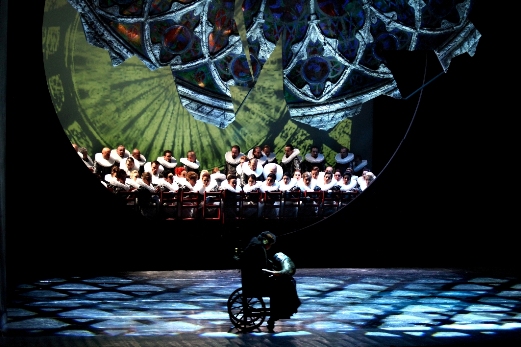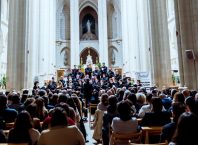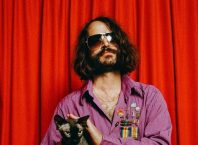An exhilarating new production of Verdi’s Ernani, a co-production between the Israeli Opera and the opera houses of Poznan and Bilbao, will premiere Friday, January 7, 2011 at the Israeli Opera in Tel Aviv, directed by Michał Znaniecki, who imbues the opera with a contemporary artistic sensibility.

Guiseppe Verdi (1813 – 1901) based Ernani on the play Hernani by Victor Hugo (1882-1885). The plot turns on the conflicting claims of honor and passion as three men –the bandit, the wealthy old aristocrat and the King – are all in love with Elvira. The premise sounds appealing, but as one might suspect, it does not end well.
Polish director, designer and playwright Znaniecki, has a diverse and impressive repertoire. The youngest person to direct an opera at La Scala (at age 24) the peripatetic Znaniecki is as comfortable with street theatre and improvisation as with Verdi and Donizetti, regularly directing theatre, musicals, and opera – often all in one season. General Manager of Teatr Wielki Opera Poznan since 2009, he is the founder of Ape Teatrale which brings works to alternative and outdoor spaces, and since 2005, Artistic Director of CON-Teatro in Turin, an organization that merges the experience of professional actors, teachers, design and communication experts with groups from different locations and situations, including students and non-actors, creating theatrical productions that have a deep connection to the local experience.
Midnight East had an exciting time racing to keep pace with the fascinating director, who graciously agreed to conduct a backstage interview at intermission during last night’s general rehearsal for Ernani.
Ayelet Dekel: I’m wondering if you could share with me your approach to Ernani in terms of directing and design, which I understand is all one vision?
Michał Znaniecki: The vision is based on a problem because Ernani is a story that we don’t believe more and also it’s about the values we don’t believe. It’s about honor, it’s about dying on the day of your wedding, so it’s something that we don’t believe any more… and there is no religion in it, so there is no ideology. It’s an absolutely different world of values. So I was looking at this play not as a realistic play, because if it is realistic we don’t believe in it. It’s not telenovela, you know, so it’s opera always. I was trying to find something that has this meaning – of the values that we don’t believe anymore, but Verdi believed – maybe – because he chose the story.
For this reason I built this historical titanic, you know, this platform [much of the opera is enacted on an enormous extremely tilted platform in the shape of a stained-glass rose window that covers the stage] from the Rosetta of Saragossa from the cathedral in Saragossa at the ending of the story, going down. There is something of danger, or a situation that we don’t stay calm, that’s not normal, it’s something absolutely not normal. So I think it was the beginning – to build this set and even the relations, the behaviors of the characters.
Because the problem with the first act is that in the first act you have this strange situation that every character introduces herself, or themselves, or himself. So we have Elvira, we have Ernani, we have Don Carlo, you have Silva so it’s so epic, so operatic – you know it’s strange, so lets keep this like this: four people on the stage. [The opera begins with the four principals onstage where they remain for the entire act – even when they are not active participants in the scene]. The relation it’s something like: line, line, line [referring the different connections between the characters] and they love one woman and they hate each other – and the other things are not so important. So basically we have this set, we have this situation. I wanted them all the time on the stage.
AD: That is very unusual for opera.
MZ: It was incredible for them, for the singers, but they understood it. After, they said ok, we understand better our relations with the others, because if I am looking at Elvira being loved and kissing with the others, I have different energy and I enter the stage differently. It’s important for everyone and for us [audience] it’s stronger to see the jealousy and everything in the situation as they are on the stage.
For this reason it is not a realistic set, it is an abstraction, even the costumes. In the costumes – you have different costumes, they seem to be historical but they are not. Because they have the meaning – the colors of the costumes change in every act for the chorus and they will have different meaning. I think it is important to use Velasquez and Spanish history of design, but it’s not really historical, so I was working on that too.
I had my two months of travelling in Spain just looking for Ernani, I made a lot of pictures and with these pictures I built the set and built the costumes.
AD: I know you teach improvisation technique, how relevant do you find improvisation for the opera?
MZ: I think it’s the same thing for the direction and for the singers and this is my way of working. In improvisation you have to have a very strong structure like cage, I call it a cage. When I arrive in my lesson I say: ok you have this cage, you have five minutes and you have to go from this part of the stage to this part of the stage and you have for this five minutes – and you have now to feel it. This is your cage. And now you make inside what you want. In music with opera we have the same, because we have this composer who takes this tempo, this time, this movement this pausa – because you know in drama theatre you work on pausa, here we have the pausa from Verdi so you have to respect it. This is a cage and what we put inside is the improvisation. It’s my idea [referring to directorial vision] I can explain it to the singers, but after they know the structure they have to feel it, with the emotions, with the interpretation, acting what you want. But I don’t explain it to them; I don’t show them like Zeffirelli how to express your love. No, I don’t… Express only this relation: so you hate him, you love him and you have 5 minutes to express it.
When I teach it is different because there is no structure of music, but when I direct I have this structure and I enjoy it because there is this limitation but I have to find my freedom in it and it’s beautiful. Even this cage [referring to the tilted platform on which Ernani is performed] I told them don’t pretend that there is no difficulty to walk on the platform. Show it because I’m interested to show it. In the beginning they said: “I can’t walk fast.” Ok, you don’t walk fast because I don’t want to… I want to use this platform so just… you can lie down, you can fall down, you can be perfect, heavy or light –
but use it! Don’t pretend that there’s no platform. And really they work very well, every cast is different in this situation, and this is improvisation always.
AD: You have this amazing artistic playground, you’ve worked on the finest stages of the world with the best actors and singers, and it makes me curious to see that you are the director of a group like CON-Teatro doing work in alternative spaces often with non actors.
MZ: I really need it. The world of opera is with different characteristics – very different than musicals, very different than alternative theatre, so every kind of theatre has different energy. And my characteristic, my quality, is that I’m able to change everything I know every time when I work with a new project. So I change my mind, my culture, my knowledge. When I work with musicals I change everything, when I work in La Scala I change everything, when I work in different countries, when I work with old people making King Lear [loosely based on Shakespeare’s play, created with actors and residents of senior centers]. And I really need it because I very easily bored.
So I just need to change and I have to believe totally in something that I am doing. So every month I change the family [genre], the city, the project and I would like to change it really. So I am trying to have one tragic opera, a month later a comedy in the theatre, a month later work with my students in Turino, in Vienna, in Naples, a month later make some monodrama with one actress or actor…changing because if I play in only one world of theatre it will kill me I’m sure.
I do this as my passion but I want to learn, every time I want to learn something new. So if I know that I am doing well opera – I have to stop. For this reason I prefer to change: to change the culture, to change the city, to change the theatre, just to discover new things. If not it will be routine and I don’t want to be a routineer. Every performance, every project is different than my old one. We are working always – with my assistants with my set designers – [saying:] ok this solution was perfect, it was beautiful – don’t use it anymore. Let’s find something new.
And I want to risk every time – new ideas, new technique. Now I’ve done Onegin two weeks ago in Krakow, with water. It was everything in the water, in ice just melting down. Ice and water then, like the heart of Onegin. It was a new experience for me. Samson et Dalila [Grand Opera by Camille Saint-Saëns] that I will have now in February in Trieste, is done in industrial, very modern set. No romantic, no French set, not Biblical, but absolutely modern industrial. I’m looking every time for the risk and to discover new things. I like to change the level. For me, working in opera of Bilbao or La Scala or in the street is the same energy, is the same quality, is the same passion – but absolutely different way of working. And I love it, I need it.
AD: And the experience of Ernani in Israel, was that different?
MZ: It was different making it in Spain, because there is a different tradition of Ernani, it was different to make it in Poland. I had three different projects of Ernani in the last three years and every project was different because I was different. I changed a lot, and of course Israel is different because I work with new people. I’m trying to understand the audience and trying to understand a little bit what they are used to. When I arrive in the theatre and I see La Boheme of Zeffirelli I know that they know this kind of theatre. My theatre is different.
Thinking about Israel, maybe not [such a difference in the production] because I feel here at home. I don’t see the difference of culture, even if there is a difference of culture… but I feel very comfortable here, in the theatre, in the city, in Tel Aviv, so I have not the sense that I have to make something different because of culture or religion.
AD: Could you discuss your connection to opera – where do you connect to it as a director?
MZ: We can’t forget that this is convention, the style, so I don’t want to look the verisimo or the real life in it. It’s not possible: Opera is opera. I have only one way to work in the opera; it’s to trust absolutely the composer. It’s very difficult. Very difficult not to have your opinion of the composer but I’m trusting totally Verdi, Donizetti, Rossini and I’m following what they wanted to reach with this project. If Donizetti wrote Don Pasquale in ten days I understand why there is a problem with this or with that because he just wants to do it for money. If I know the best opera of Verdi – King Lear, he never wrote it, but he was trying to write it every week of his life. I know that I have to do it, and I know that it is important for him and for me. It’s very important just to trust the composer. If Verdi wanted to shock La Fenice [the first performance in 1853 took place at La Fenice in Venice] with La Traviata, we have to do the same but we have to shock the public of today. So I can’t make La Traviata with that she is ill with TB, the illness that we don’t know more, so we have to do it with cancer. So it’s absolutely logical because the audience will know cancer like we know, and they will be shocked. So this is important just to find… so Puccini –you want to move people, and make them cry. But if Verdi wanted to make something contemporary, very modern for the time – now we see it in crinoline, but it was at the time the same costume for the people on the stage and in the audience. It’s interesting just to follow the composer: if they wanted to shock, I want to shock, if they wanted to provoke, I want to provoke, if they wanted to make history abstract things like beautiful singing like in Ernani – I do it like he wanted. Lucia [the opera Lucia di Lammermoor by Gaetano Donizetti, 1835] is total gothic. But its not real gothic, so I can make it more gothic than Donizetti could explain.
Ernani will be performed at the Israeli Opera, Tel Aviv Performing Arts Center from January 7 – 22, 2011. For additional information and tickets consult the Israeli Opera website or call: 03-6927777.
AYELET DEKEL






Please keep me informed,
Thank you !
Comments are closed.